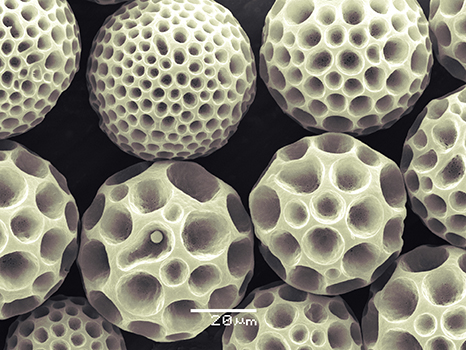Regenerative Medicine and Cellular Therapies Division
We are transforming basic scientific research at the interface of biomaterials discovery and development, nanotechnology, bioelectronics, bioengineering, stem cell and cancer research into disruptive technologies for regenerative medicine and cellular therapies.
We conduct basic and applied research focussed at studying and controlling cellular processes. For therapeutic benefit through the development of:
- scaffolds
- hydrogels
- microparticles
- nanotechnology for analytics and therapeutics
- technology for sensing and modulating bioelectricity
We are developing new technologies to develop bioelectronics medicines. Materials are derived from natural and synthetic polymers and have been shown to control mammalian cell behaviour to stimulate tissue repair processes.
We are also developing non-viral delivery systems for the delivery of DNA, mRNA and proteins to control tissue regeneration.
 Biodegradable dimpled microparticles being used to study surface topography effects on 3D mammalian cell behaviour.
Biodegradable dimpled microparticles being used to study surface topography effects on 3D mammalian cell behaviour.
We have expertise in electrochemical nano-systems supported through significant funding from the EPSRC.
A key focus for our work is in bone regeneration and we work closely with our clinical colleagues and the UK Regenerative Medicine Platform Hub, funded by the Medical Research Council (MRC), to ensure a translational goal for our research.
Research themes
Collaborations
We lead in the development of materials that are stimuli responsive, self-assemble into hierarchical structures. We collaborate with the Centre for Additive Manufacturing, Faculty of Engineering, in applying 3D printing technologies to develop functional tissue units. Together we lead the University’s Interdisciplinary Research Cluster in Additive BioFabrication which aims to bring researchers together across the disciplines to expand our capabilities in 3D bioprinting.
Related links